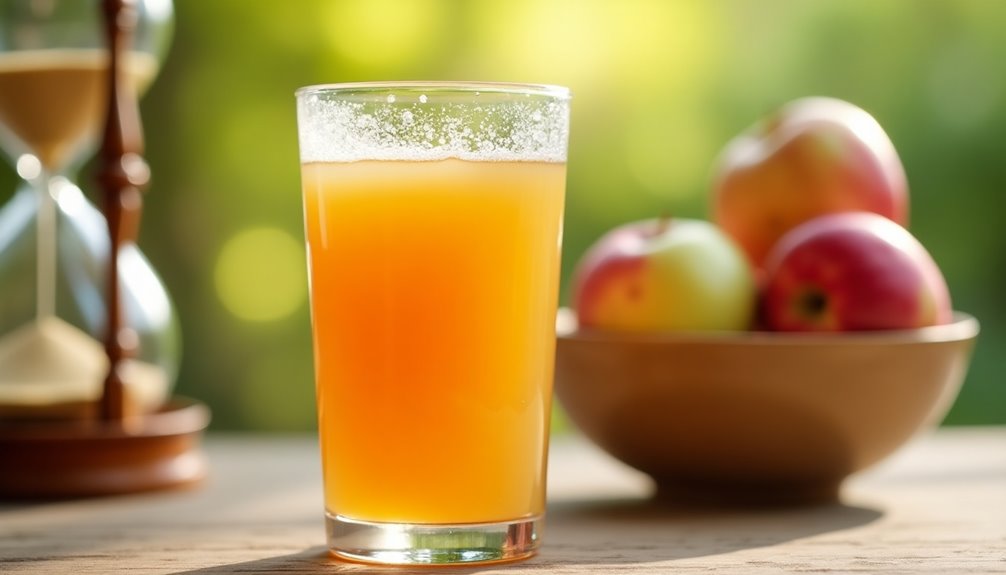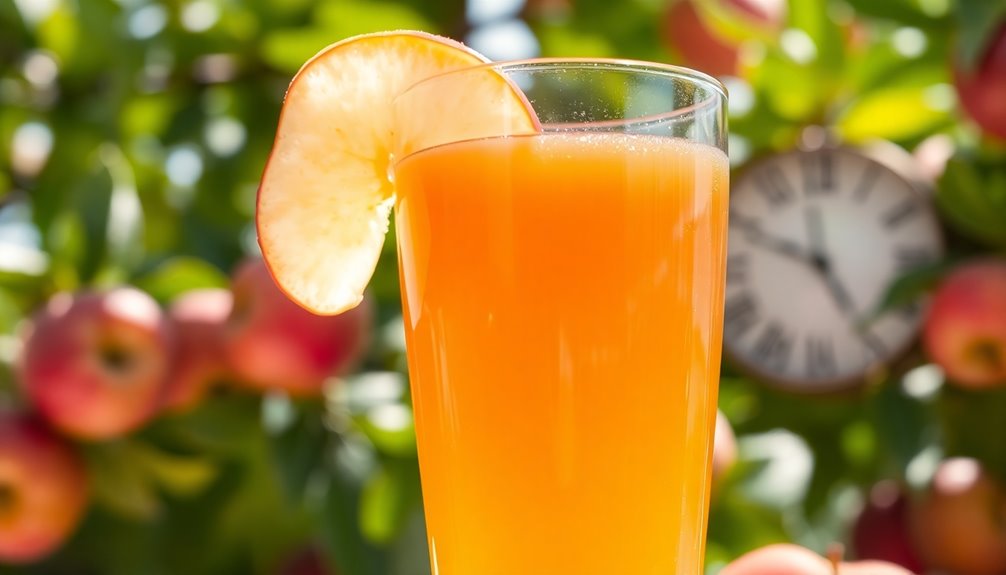Apple juice can make you poop anywhere from 15 to 60 minutes after you drink it. Its high fructose and sorbitol content stimulate your digestive system, while the juice's water content helps keep you hydrated. Sorbitol softens stools, making it easier for them to pass. However, how quickly it works can vary based on your individual sensitivity to these sugars. If you want to understand more about how it affects digestion, there's plenty to explore.
Key Takeaways
- Apple juice can induce bowel movements within 15 to 60 minutes due to its digestive properties.
- The high fructose-to-glucose ratio and sorbitol in apple juice stimulate digestion.
- Sorbitol in apple juice draws water into the colon, softening stools and easing passage.
- Individual responses vary; some may experience quicker effects while others may take longer.
- Staying hydrated with apple juice supports overall digestive health and helps prevent constipation.

When you drink apple juice, you might notice its effects on your digestion fairly quickly. Within just 15 to 60 minutes, you could find yourself experiencing a need for a bowel movement. This rapid response is largely due to the unique composition of apple juice, particularly its high fructose-to-glucose ratio and sorbitol content. These elements work together to stimulate your digestive system, helping to move things along when you need it most.
The sorbitol in apple juice plays a crucial role in your digestion. Sorbitol is a type of sugar alcohol that draws water into the colon, which can soften stools and make them easier to pass. This is particularly beneficial if you're dealing with constipation or irregular bowel movements. The added hydration from the juice itself—about 90% water—also contributes to this effect, ensuring that your body has the necessary fluids to maintain regular bowel movements.
Moreover, while apple juice isn't high in dietary fiber, it does contain around 0.5 grams per cup. Though this amount may seem minimal, every bit helps when it comes to promoting gastrointestinal health and aiding in digestion. Dietary fiber is essential for a well-functioning digestive system, as it helps add bulk to your stool and promotes regularity.
So, when you combine the effects of sorbitol with the small amount of dietary fiber in apple juice, you've got a drink that can effectively enhance your digestive process.
It's important to note that individual responses to apple juice can vary. For some people, the laxative effect can kick in sooner than for others, depending on their sensitivity to the sugars present in the juice. If you're someone who's particularly sensitive to fructose or sorbitol, you might find that apple juice triggers bowel movements more rapidly than it does for others.
On the other hand, if you have a more robust digestive system, the effects might be less pronounced or take a bit longer to manifest.
Staying well-hydrated is crucial for your digestive health, and drinking apple juice can certainly contribute to that. Proper hydration helps prevent constipation and supports overall digestion by ensuring that your body has the necessary fluids to break down food efficiently.
If you're looking for a tasty way to keep things moving in your digestive system, a cup of apple juice may just do the trick.
Ultimately, if you're curious about how long it takes for apple juice to affect your digestion, be prepared to pay attention to your body's signals. Whether it's a quick response or a more gradual one, the combination of sorbitol, hydration, and a bit of dietary fiber can be quite effective in promoting regular bowel movements.
Frequently Asked Questions
How Long Does It Take for Apple Juice to Help You Poop?
When you drink apple juice, you might notice it can stimulate bowel movements fairly quickly.
Typically, it can take anywhere from 15 to 60 minutes for you to feel the effects, thanks to its high sorbitol content and hydration properties.
However, everyone's body reacts differently, so if it doesn't work for you right away, don't hesitate to try other methods to promote regularity.
Just remember, moderation is key to avoid discomfort.
What Simple Trick Empties Your Bowels Immediately?
"An apple a day keeps the doctor away," but when you need immediate relief, try drinking warm water with a squeeze of lemon.
This simple trick can stimulate your digestive system and promote bowel movements quickly. The warmth relaxes your muscles, while the acidity of lemon helps in digestion.
If that doesn't work, consider adding fiber-rich foods to your diet.
How Long Does It Take for Apple Juice to Go Through Your System?
When you drink apple juice, it usually takes about 30 to 60 minutes to move through your digestive system. Once it has been consumed, the apple juice undergoes digestion, starting from the stomach where it is mixed with gastric juices. After this initial breakdown, it moves into the intestines for nutrient absorption. If you’re curious about how long opened apple juice lasts, it typically remains safe to drink for about 7 to 10 days when stored in the refrigerator.
The sorbitol and water content in the juice help with hydration and digestion.
However, your individual sensitivity to the sugars can influence how quickly it affects you. Some might notice results sooner, while others may take longer.
Just remember, moderation is key to avoid any digestive discomfort!
How Much Apple Juice Will Give You Diarrhea?
If you're wondering how much apple juice can cause diarrhea, it really depends on your sensitivity.
Generally, consuming over four ounces can lead to gastrointestinal distress, especially if you're sensitive to fructose or sorbitol.
Drinking more than eight ounces increases the chances of experiencing diarrhea, as your body may struggle to process all the sugars.
It's best to monitor your intake and adjust based on how your body reacts.
Conclusion
So, next time you sip on a refreshing glass of apple juice, remember its potential digestive effects. You might find it surprising that what seems like a simple drink can have such a quick impact on your system. You could be enjoying a sunny afternoon, and suddenly, you're dashing to the restroom! Coincidentally, that burst of urgency could just be the apple juice working its magic, reminding you that nature often has its own timeline for things.
Cindy thoroughly researches juicing trends, techniques, and recipes to provide readers with practical advice and inspiration. Her writing style is accessible, engaging, and designed to make complex concepts easy to understand. Cindy’s dedication to promoting the advantages of juicing shines through her work, empowering readers to make positive changes in their lives through the simple act of juicing.











